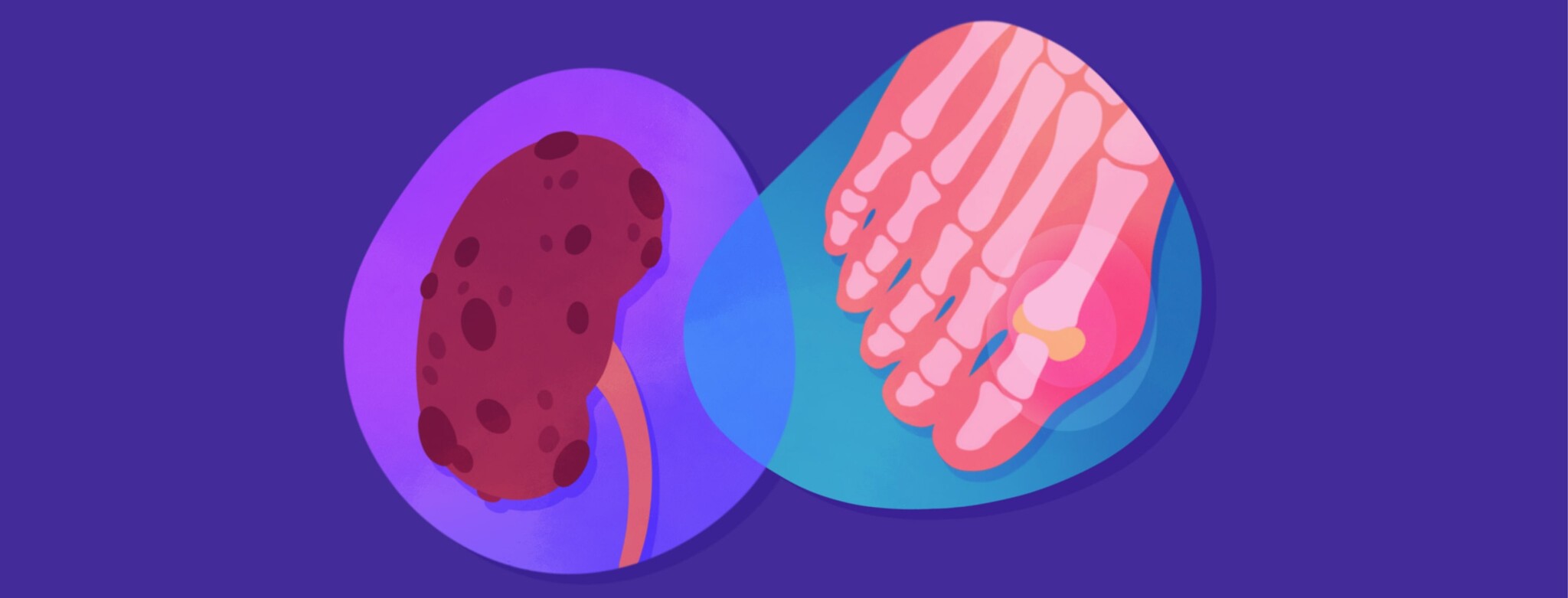What is Gout?
Reviewed by: HU Medical Review Board | Last reviewed: February 2023 | Last updated: February 2026
Though chronic kidney disease (CKD) mainly affects the kidneys, it also can affect many other parts of the body. If you are living with CKD, it is important to be aware of the health problems that can occur with it (called complications). That way, you can be on the lookout for signs of these complications. One common complication of CKD is gout.1
What is gout?
Gout is an “inflammatory arthropathy,” meaning a joint disease caused by inflammation. It occurs when uric acid builds up in your body.1,2
Uric acid is a normal substance that your body creates as it breaks down proteins. There are two ways that uric acid can build up. One way is when your body makes too much uric acid. The other way is when your kidneys cannot filter enough uric acid out of the blood to get rid of it in pee (urine).2
In either case, uric acid can build up in joints, causing redness, swelling, and sharp pain at the joint. Gout commonly affects the joints in your big toes. This is called podagra. However, it can also build up in other joints, like your knees, or create kidney stones.1,2
Who gets gout?
Experts estimate that about 4 percent of the US population has gout. Men are about 3 times more likely to develop gout than women.1
Those who are living with CKD also are more likely to develop gout than those who are not. As the number of people living with CKD increases, so does the number of people living with gout. However, it is possible to develop gout without CKD.1
The main risk factors for developing gout include:1
- Having high levels of uric acid in your blood
- Being male
- Being age 65 or older
- Being post-menopausal
The main risk factors for developing CKD include:1
- Having diabetes
- Having high blood pressure
- Having family members with kidney disease
- Being of African American, Hispanic, Pacific Islander, or American Indian descent
How are CKD and gout linked?
The relationship between CKD and gout works in both directions. In one direction, CKD can cause gout by making it difficult to get rid of uric acid.2,3
When your body creates uric acid, it pushes it into the bloodstream. Your blood then flows through your kidneys, which remove the uric acid and add it to urine to leave the body. With CKD, your kidneys are not able to filter your blood as well as they should. This leads to a buildup of substances like uric acid. High levels of uric acid, or hyperuricemia, can then deposit in joints and appear as gout.2,3
In the other direction, gout can cause kidney damage. Having high levels of uric acid can damage your kidneys. Uric acid can also form into sharp kidney stones inside a kidney that can cause damage as they are being passed. A 2019 study found that people with gout were more than twice as likely to develop kidney failure than those without gout.3
Diet changes to manage gout
If you have gout, one way to reduce your likelihood of flares is by changing your diet. There are some foods that have high levels of “purines.” Purines are broken down by the body into uric acid. Foods to avoid or limit include:2
- Organ meats
- Shellfish
- Beer
- High-fructose corn syrup
Reducing all meats and adding in more plant-based meals also may help. Everyone should eat fruits and vegetables often as well as drink enough water to stay hydrated. Good hydration helps the kidneys do their job to filter the blood.2
Talking to your doctor about CKD and gout
CKD and gout often occur together. If you are currently living with one of these conditions, talk to your doctor about your risk of developing the other. They can give you an idea of signs or symptoms to look out for. They also can order blood work to check your kidney function and uric acid levels.1
Experts used to believe that gout was only present during its painful attacks. Because of this, doctors often prescribed drugs only to stop the attack. But experts now understand that gout is a chronic disease. It will progress if it is not treated. Speak to your doctor about the right gout treatment for you.1

Join the conversation